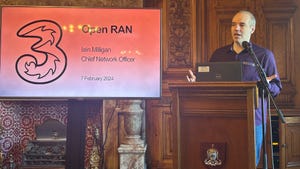Casa Systems has chance to lead virtual CCAP market, new CEO says
Michael Glickman, Casa's new CEO, says the supplier is primed to disrupt its own cable access business with its virtual CCAP product and also will look to disrupt the router hardware market with its virtual broadband network gateway.

Casa Systems intends to disrupt itself and other markets using virtualization as the common thread that binds those two approaches together, according to new CEO Michael Glickman.
Casa aims to disrupt itself with a virtualized converged cable access platform (CCAP) that cable operators are starting to deploy that – perhaps someday – will phase out the purpose-built CCAP hardware that has long served as the foundation of Casa's cable technology portfolio.
Meanwhile, Casa is looking to disrupt router suppliers such as Juniper Networks, Nokia and Cisco Systems with a virtualized form of the broadband network gateway (BNG) that can deliver subscriber management functions across multiple types of access networks, including hybrid fiber/coax (HFC), fiber-to-the-premises (FTTP) and wireless.
Glickman, an exec who once ran the global service provider business at Cisco, said virtualization will be core to the company's focus and strategy going forward across the company's work with cable operators, telcos and wireless/mobile service providers.
"We've been talking about it for ages it seems, but now we're starting to see some of these [virtualized] architectures actually play out," said Glickman, who succeeded company founder Jerry Guo in the CEO role on August 1.

Michael Glickman most recently served as president of PacketFabric, and previously served as SVP for Cisco's global service provider unit. (Source: Casa Systems)
Taking aim at the vCCAP market
Casa is one of a small group of suppliers that have developed a vCCAP, and has identified Rogers Communications and Claro Colombia among some initial takers of that platform. But Casa has a tough task ahead if it's to become a major challenger in that part of the cable tech sector.
Harmonic has a big lead in vCCAP market thanks in part to its position at major US cable operators such as Comcast and Charter Communications. CommScope, another top cable industry supplier, is back in the game after resurrecting and restarting its vCCAP initiative. Vecima Networks may take a run at the vCCAP market. Meanwhile, Cisco's a bit of a wildcard while its vCCAP efforts remain on an indefinite hold.
"In that [vCCAP] space, we are, in essence, disrupting ourselves" as the market moves from purpose-built CCAP hardware to virtualized formats, Glickman said. "That's where I give my predecessor [Jerry Guo] and Casa a lot of credit, because it's very difficult to do that to yourself … and be at the forefront of it."
Glickman acknowledges that it's a tough transition for any hardware supplier. "It becomes really difficult, because the revenue and the profit that you used to take out of those purpose-built hardware platforms ends up going down for a bit," he explained. "It turns into all software running on somebody else's server for the most part, and then finally starts to grow after that. That's a tough thing to invest into … But we have the ability to really lead it."
Glickman said he is in the process of obtaining a full view of Casa's vCCAP opportunity, but he likes what he's seen so far.
"I think it's fair to say that pretty much every cable MSO I've talked to across the world – and I've been in Asia and I've been in Europe and obviously North America and South America for that matter – are moving towards some version of a virtual CCAP architecture," he said. "Generally speaking, we are past RFIs [requests for information] and, in certain cases, past RFPs [requests for proposal], and now into proof-of-concept or early deployment."
He also believes that the vCCAP market is poised to open up further now that the debate about the distributed access architecture (DAA) has been largely settled, with most operators leaning toward architectures that team a vCCAP with remote PHY.
Virtual BNG for HFC, FTTP and wireless
Glickman said Casa will also concentrate its efforts on the virtual BNG and try to disrupt a market that's historically been dominated by hardware routing companies.
He said virtualizing the BNG will help service providers accelerate the development and launch of features while also taking advantage of less expensive commercial off-the-shelf (COTS) servers.
But Glickman also views the vBNG as a valuable and attractive product category for cable operators as they continue to deploy fiber-to-the-premises (FTTP) in greenfield areas but are also seeking a subscriber termination/management platform that can support their widely deployed HFC networks.
"What we have now in a virtual BNG could actually serve both of those infrastructures," he said, noting that the vBNG could also be adapted to manage customers on wireless access networks. "A deep and wide portfolio of virtualized network function is a space that I really want us to lead in. It's not only because building a scalable, recurring software business is valuable in the marketplace. It's also because that's what's going to help our customers make these migrations."
Prior to Glickman's arrival, Casa made moves to diversify its overall business by focusing on the telcos as well as wireless and 5G. That work, which includes a multi-year deal to supply 5G core software for Verizon's public mobile edge compute (MEC) offering, continues on.
Meanwhile, Glickman has made some leadership changes as he settles into his new role at Casa. Earlier this month, the company named Colin Kincaid to the post of chief product officer and Phil Paro as chief accounting officer. Kincaid has the closest ties to the Glickman and the telecom industry, having most recently served as CTO of Cisco's global service provider business. Paro joined Casa from Tomorrow.io, a company focused on weather intelligence, but is also late of Acme Packet (acquired by Oracle in 2013).
Glickman said he expects to make some additional new hires, but stressed that his "intent is to have a nice mix of some of the leadership that built Casa to where it is today."
About the Author(s)
You May Also Like


.jpg?width=300&auto=webp&quality=80&disable=upscale)









